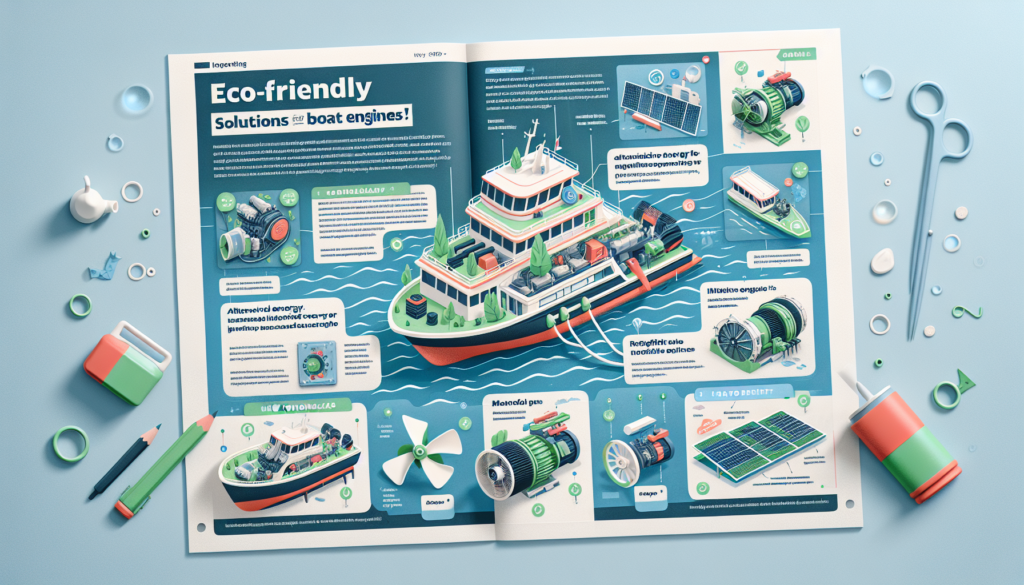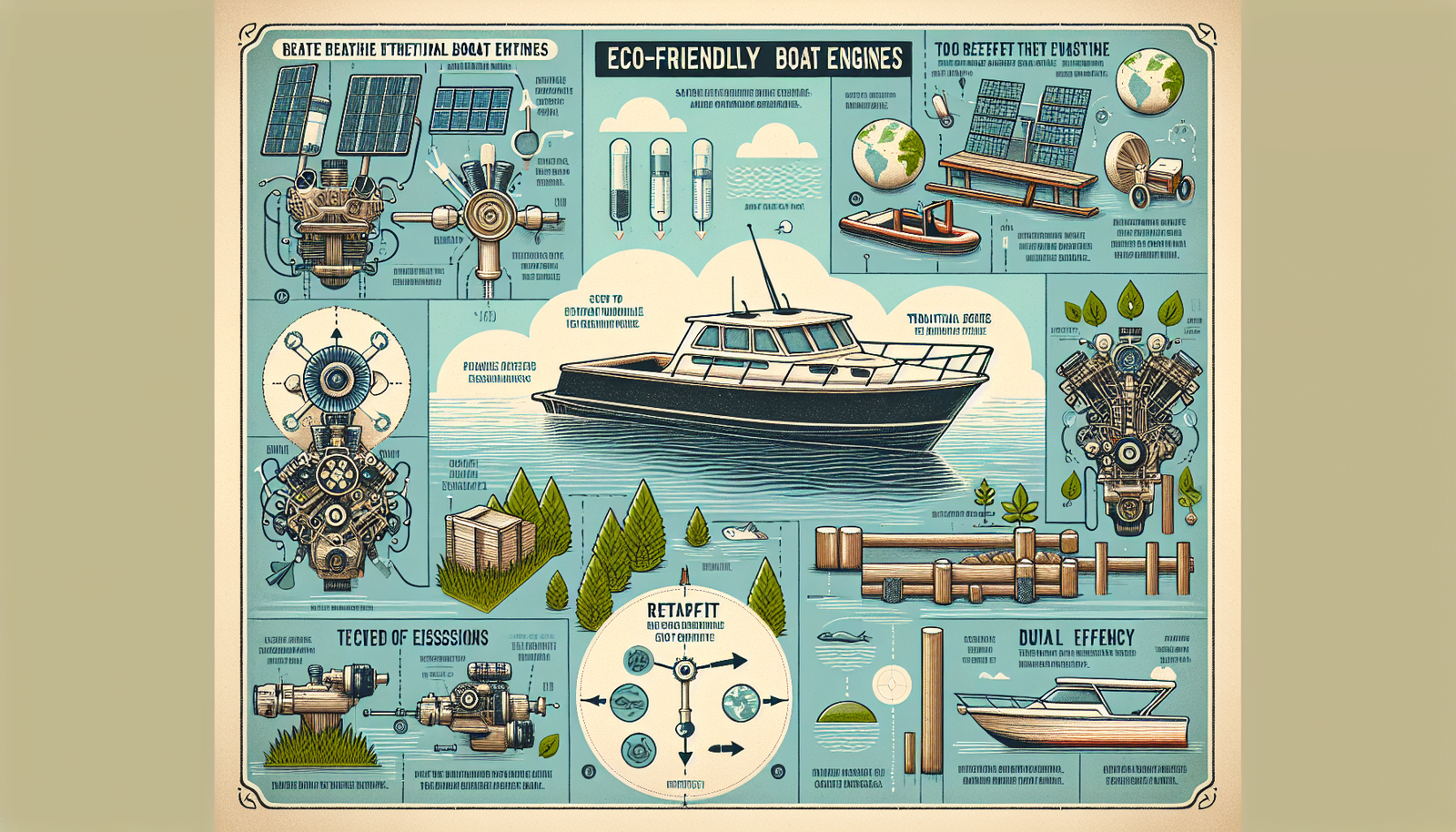If you’re an avid sailor or simply a fun-seeking boater, understanding the ins and outs of eco-friendly boat engine options could be a real game-changer for you. In today’s rapidly changing environmental landscape, it’s more important than ever to ensure that your aquatic adventures aren’t harming the planet. In this article, we’ll help you navigate the waters of renewable marine power, offering a detailed examination of various green engine alternatives; from battery-electric and solar electric systems to hybrid and hydrogen options. Get ready to embark on a journey that not only accentuates your love for the blue expanse but also redefines it in a way that harmonizes seamlessly with nature’s rhythm.

Understanding Eco-Friendly Boat Engines
Ever been out on a serene lake, listening to the peaceful sound of the water lapping against the sides of your boat, only to have the calm interrupted by the loud growl of a traditional boat engine? If you’ve had this experience, then you certainly know the inherent contradiction of enjoying nature while simultaneously contributing to its pollution. Enter eco-friendly boat engines—the perfect bridge between advanced technology and environmental responsibility.
Defining Eco-Friendly Boat Engines
So what exactly are eco-friendly boat engines? Simply put, these are engines designed to lessen the environmental impact caused by boating activities. While traditional petrol and diesel engines spew harmful toxins into the environment, and contribute to water pollution, eco-friendly engines aim to reduce this negative impact. This is achieved by switching to alternative energy sources like electricity, solar power, hybrid energy systems or biofuels.
Benefits of Eco-Friendly Boat Engines
There are numerous benefits to using eco-friendly boat engines. The top one is, without a doubt, the reduction in environmental harm. No toxic gases, less noise pollution and a significant decrease in water pollution in particular. But that’s not all. These engines can also prove cost-effective in the long run due to lower maintenance and operating costs.
The Environmental Impact of Traditional Boat Engines
One cannot appreciate the need for eco-friendly boat engines without understanding the environmental impact of traditional boat engines. The release of carbon emissions, oil residues and other forms of pollutants directly into water bodies can have adverse effects on ecosystems. Not to mention, it contributes significantly to global climate change. The noise pollution caused by these engines also disrupts marine life—clearly indicating the need for a better alternative.
Types of Eco-Friendly Boat Engines
Now that you understand the importance of eco-friendly boat engines, let’s dive into the different types available to you. Each has its own strengths and limitations, and knowing these can help you choose the right one for your requirements.
Electric Boat Engines
This type of boat engine relies on batteries, which means there’s no need for any form of fossil fuel. Electric engines are quieter, more energy-efficient, and deliver smooth performance.
Hybrid Boat Engines
As the name suggests, hybrid boat engines combine traditional internal combustion engines with battery power. Whenever possible, these engines switch to battery power, lowering both fuel consumption and emissions significantly.
Solar-Powered Boat Engines
Solar-powered boat engines use the power of the sun, through solar panels, to run. Extremely eco-friendly and quiet, these engines are perfect for slow and steady cruises.
Biofuel Boat Engines
Lastly, biofuel boat engines run on made-from-scratch fuels, which are typically derived from natural and renewable resources. They significantly reduce carbon emissions compared to traditional fuels.
Understanding Electric Boat Engines
Electric boat engines run on battery power, which can be charged from a mains supply or with a generator on-board.
Advantages of Electric Boat Engines
These engines offer several advantages including less noise pollution, zero harmful emissions, lower fuel costs by avoiding petrol or diesel, and easy maintenance. They also provide a smoother ride without the vibrations common to traditional motors.
Limitations of Electric Boat Engines
There are however a few limitations. The main one being the limited range as it directly depends on the battery capacity. Charging times may also be long, and you’d need to ensure a reliable source of electricity is available.
Maintenance and Servicing of Electric Boat Engines
Electric boat engines require relatively lower maintenance compared to their traditional counterparts. There’s no need for oil change, no cooling system to maintain, and the engine components tend to have a longer lifespan. That said, regular checks on the battery health and keeping the electrical connections clean is crucial.

Discovering Hybrid Boat Engines
Hybrid boat engines strike a balance between traditional and wholly electric systems. This technology is increasingly getting adopted due to its various benefits.
Components of Hybrid Boat Engines
Typically, a hybrid boat engine will have an internal combustion engine (for high speed requirements), an electric motor (for low speed), a battery bank, and a generator to recharge the batteries.
Efficiency of Hybrid Boat Engines
Hybrid engines provide excellent efficiency since they can switch to a purely electric mode for slow speed cruising, using fuel only when higher speeds are required. This significantly reduces fuel consumption and emissions.
Cost-effectiveness of Hybrid Boat Engines
A hybrid boat engine might be more expensive initially due to the extra components. But the overall operational cost can be lower in the long run as it reduces fuel usage, and maintenance requirements are significantly less due to the reduced wear and tear on the engine.
Exploring Solar-Powered Boat Engines
Solar-powered boat engines might seem like something out of science fiction, but they are indeed a reality and are increasingly popular, especially in the leisure boating sector.
Functionality of Solar-Powered Boat Engines
Essentially, solar panels installed on the boat capture sunlight, converting it into electricity. This electricity is used to power the boat’s motor and other onboard systems.
Practicality of Solar-Powered Boat Engines
Now, you might wonder about the practicality of such systems. While it’s true that the efficiency would depend on the availability of sunlight, improved battery technologies allow for energy storage. This means the boat can still run even without direct sunlight. However, these systems are more suited for lower speed boats due to their power limitations.
Solar-Powered Boat Engines’ Impact on Environment
The environmental benefit of solar-powered boat engines cannot be overstressed. They produce zero emissions, and make almost no noise, thereby minimizing their impact on aquatic life.
Understanding Biofuel Boat Engines
An alternative to the technologies mentioned before is the use of biofuels in boat engines. Biofuels come from renewable resources and can replace diesel or petrol without the need for modifying boat engines.
Production and Function of Biofuels
Biofuels are usually produced from organic materials like vegetable oils, plant waste, or even animal fat. They can be used directly in diesel engines or mixed with conventional diesel.
Benefits and Limitations of Biofuel Engines
Biofuel engines can significantly reduce carbon emissions compared to traditional fuels. Though they still produce some emissions, the carbon released is offset by the carbon absorbed during the growth of the biofuel’s source materials. However, the availability and cost of biofuels can be a limitation, and it’s essential to ensure the chosen biofuel is compatible with your engine.
Impact of Biofuels on the Environment
Like the other eco-friendly options, biofuel engines play a significant role in reducing the carbon footprint. Sustainable production of biofuels also contributes to waste reduction.
Cost Considerations for Eco-Friendly Boat Engines
The decision to transition to an eco-friendly engine might seem daunting given the initial purchase price. However, considering various costs in the long run can make this decision much easier.
Initial Purchase Costs
Initial purchase costs for eco-friendly boat engines could be higher than traditional engines. This is mainly due to advanced technology components and the developing market. However, costs are expected to reduce with advancing technologies and increasing demand.
Operational Costs
Operational costs for eco-friendly engines can be significantly lower. Whether it’s the fuel savings of a hybrid engine or electric engine, or even free energy from the sun for solar-powered ones, operational expenses can be reduced considerably.
Maintenance Costs
Many eco-friendly boat engines require lesser maintenance due to the absence of many moving parts present in a traditional engine. This can lead to lower long-term maintenance costs.
Eco-Friendly Boat Engine Manufacturers and Brands
There are several manufacturers and brands which offer eco-friendly boat engines. Each one brings unique features to the table, making your choice dependent on your specific needs.
List of Prominent Manufacturers
Names like Torqeedo, Greenline, Oceanvolt, and Elco are making waves in the eco-friendly boat engine world offering a variety of options in electric, hybrid, and solar-powered boat engines. Biodiesel options are also offered by many traditional boat engine manufacturers.
Unique Features of Each Brand
Every brand has its unique selling points, be it the unrivaled range of Torqeedo’s electric motors, the hybrid solutions provided by Oceanvolt, or the solar expertise of Greenline.
Comparative Study of Different Brands
Before deciding on a brand, it’s advisable to conduct a comparative study, considering factors such as cost, power output, installation process, reviews, and after-sales service. Always remember your needs should dictate the choice.
Transitioning from Traditional Engines to Eco-Friendly Alternatives
Transitioning from traditional engines to eco-friendly alternatives doesn’t necessarily mean a complete overhaul of your boat. You can start with small changes and gradually transition.
Understanding the Conversion Process
The transition process would depend on what type of eco-friendly engine you’re opting for. While a switch to biodiesel might not require much change, transitioning to a hybrid or electric system might require replacing the entire engine and possibly other systems onboard.
Costs involved in the Transition
The costs involved will also range based on the type of transition. A switch to biodiesel will bear little to no cost, while retrofitting an existing boat with an electric or hybrid system could be a pricey affair. However, do consider the long-term operational savings when calculating costs.
Impact of Transition on Boat Performance
Transitioning to an eco-friendly engine doesn’t necessarily mean you have to compromise on performance. While it’s true that some may not offer the same power as traditional engines, advancements in technology and the right choice can ensure you get the performance that you’re looking for.
Conclusion: Future of Eco-Friendly Boat Engines
The world of marine engines is entering an exciting phase, with eco-friendly boat engines leading the way. These engines not only reduce environmental harm, but also offer significant economic benefits.
Current Trends in Eco-Friendly Boat Engines
Electric and hybrid engines are currently dominating the eco-friendly boat engines arena. However, the rise of biofuels and improvements in solar energy conversion technologies are fast disrupting this space.
Potential Future Developments in the Sector
The future of boat engines lies in the development and incorporation of sustainable technologies. We could see more powerful solar engines, advanced biodiesel options, improved battery technologies for electric and hybrid engines, and even the possibility of fuel cells and hydrogen power.
How to Keep Abreast with Developing Trends
Stay informed by keeping up with industry news, forums, and boat shows. Engage with companies, industry experts, and other boat owners to stay current with the latest trends.
The good news is that as boaters, we now have several options to help us ride the waves in harmony with nature. So next time you’re out on the water, remember, it’s not just about the destination, but also about the journey—especially if it’s an eco-friendly one.

